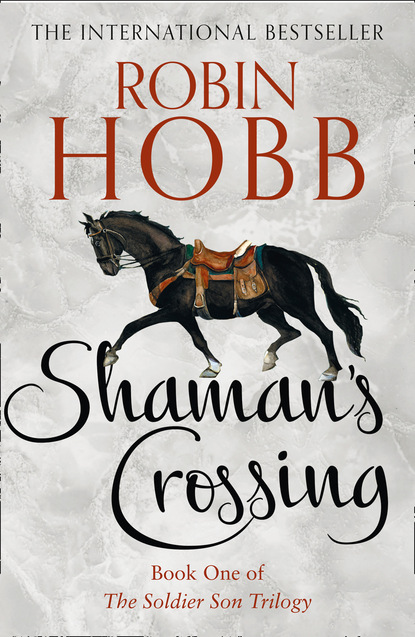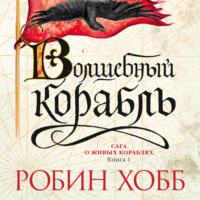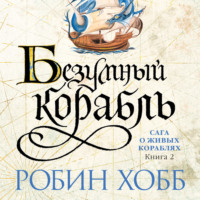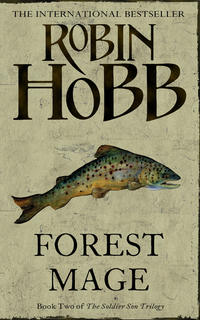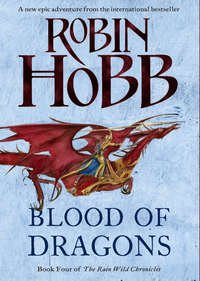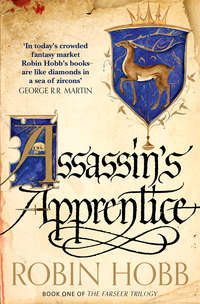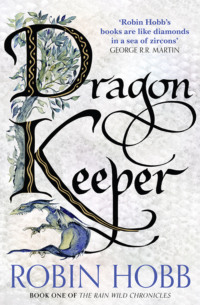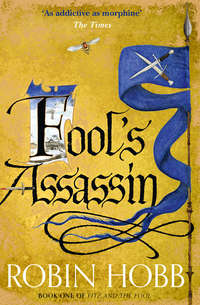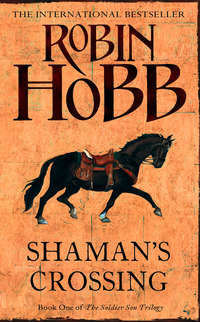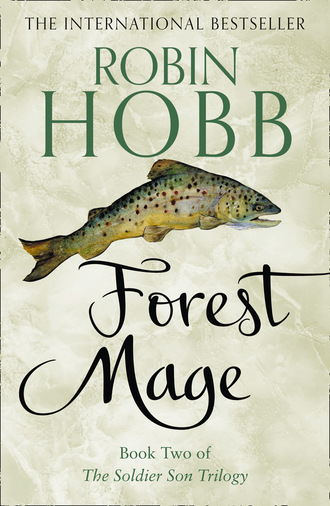
Полная версия
The Soldier Son Trilogy
‘Maybe I know a different way of asking,’ Duril suggested. ‘Sometimes coin isn’t the best way to buy something. Sometimes you have to offer more.’
‘Such as what?’ I demanded, but he shook his head and grinned, enjoying that he knew more than I did. Looking back on it, I suspect the old soldier had liked being my teacher. Supervising men clearing a field of rocks was no task for an old trooper like him. ‘Let me try a few things, Nevare. I’ll let you know if I have any success.’
I nodded, refusing to hope. ‘Thanks for listening to me, Sergeant Duril. I don’t think anyone else would have believed me.’
‘Well, sometimes it’s flattering to have someone want to tell you something. And you know, Nevare, I haven’t said I believed a word of any of this. You have to admit it’s pretty far-fetched.’
‘But—’
‘And I haven’t said I disbelieve any of it, either.’ He shook his head, smiling at my confusion. ‘Nevare, I’ll tell you something. There’s more than one way to look at the world. That’s what I was getting at, about the magic. To us, it’s magic. Maybe to someone else, it’s as natural as rain falling from clouds. And maybe to them, some of what we do is magic because it doesn’t make reasonable sense in their world. Do you get what I’m trying to tell you?’
‘Not really. But I’m trying.’ I attempted a smile. ‘I’m ready to try anything. My only other idea was to run away east on Sirlofty. To the mountains.’
He snorted a laugh. ‘Run away to the mountains. And then what? Don’t be a fool, Nevare. You stay here and you keep on trying. And let me try a few things, too. Meanwhile, I suggest you do things your da’s way. Get out and move. Show him you’re still Nevare, if you can. Don’t make him angrier than he already is. In his own way, he’s a fair man. Try it his way, and if it doesn’t work, maybe he’ll concede it’s not your fault.’
‘I suppose you’re right.’
‘You know I am.’
I looked at him and nodded slowly. A spark had come back into his eyes. Purpose burned there. Perhaps I had done as much for him by coming to him as he had done for me by simply listening.
I thanked him and there we left it, for that night.
SEVEN
Dewara
I knew when my father decided to inform everyone of my utter failure. When I descended the stairs the next morning and went to the kitchen for a quick bite of food, the servants already knew of my disgrace. Previously they had treated me with a puzzled deference. I was a son of the household, and if I chose to eat in the kitchen instead of with my family, it was my own business. Now I sensed my diminished status, as if they had been given permission to disdain me. I felt like a stray dog that had crept in and was hoping to snare a few bites of stolen food. No one offered to serve my meal to me; I was reduced to helping myself to whatever was there and ready, and all the while, stepping back and out of the way of servants who suddenly found me invisible.
The gossip of the servants revealed that my brother and his new bride would be returning that evening. There would be a welcoming dinner tonight, and perhaps guests on the morrow. No one had bothered to tell me any of this. The exclusion from the family news was as sharp as a knife cut.
I left the house as soon as I could, taking a fishing pole from the shed, and going down to the river. I baited for the big river carp, some the size of a hog, and each time I caught one, I battled it to the river’s edge and then cut it free. I wasn’t after fish that day, but after something I could physically challenge and defeat. After a time, even that ceased to occupy me. The heat of the sun beat down on me and I started to get hungry. I went back to my father’s manor.
I tried to go in quietly. I’m sure my father was laying in wait for me. The moment I was through the entry, he appeared in the door of his study. ‘Nevare. A word with you,’ he said sternly.
I knew he expected me to follow him into the study. My Speck obstinacy surfaced. I stood where I was. ‘Yes, Father. What do you want of me?’
He tightened his lips and anger flared in his eyes ‘Very well, Nevare. It can as well be said here. Your mother shared with me the wild tale you told her.’ He shook his head. ‘Was that the best excuse you could manufacture? Mocking our god because you ruined your future? Now that you have destroyed all your prospects and cannot return to the Academy, you think that we must support you for the rest of your days. I warn you, I will not shelter and feed a lazy leech. In the doctor’s opinion, you are incapable of soldiering for the King in your present condition. But I intend to change your condition, while wringing some worthwhile work out of you, and eventually I intend to send you off to enlist as a foot soldier. You will never be an officer, but I will not support you in thwarting the good god’s plan for you.’
I held up my hand, palm towards him. I met his gaze in a forthright manner. ‘Simply tell me what tasks you want me to do. Spare me a lecture I’ve already heard from you.’
His surprise lasted only for a moment. Then he gave me his list of dirty tasks. All involved heavy labour and most had something to do with dirt, excrement or blood. A manor is like a farm, and tasks of those sort abounded, but always before, he had assigned them to hirelings. Now he chose them for me, and I was well aware it wasn’t because he thought I could do them well but because he found them distasteful and therefore assumed that I would. I lost most of the remaining respect I had for him, then. All the education he had poured into me, and in a fit of pique, he would waste it. I did not let my thoughts show. I nodded to him gravely and promised to begin my work. It involved a shovel and a lot of manure and a farm wagon. Actually, it was fine with me, and in accord with what Sergeant Duril had suggested, that was how I spent my afternoon. When I judged I’d put in a fair day’s work, I left my task and walked down to a shoal water of the river. Thick brush guarded the riverbank, but there was a deer trail through it. The slower water in the shallows was sun warmed. I stripped and waded out and washed away the sweat and grime of my work. I’d often swum here as a boy, but now it felt strange to stand naked under the sun, even in such an isolated place. I was ashamed of my body and afraid I’d be seen, I realized. The increased weight I carried brought more problems than simply ill-fitting clothes. My feet ached just from carrying my weight. I sweated more and smelled stronger after a day’s labour. My clothing often chafed me. Nevertheless, after I’d sloshed water over myself, it was restful to lie in the shallows and feel the contrast between the warm sun on my skin and the cooler water flowing past me. When I finally came out, I sat on a large rock and let the sun dry me before dressing again. I’d regained a small measure of peace.
I stole an evening meal from the kitchen, much to the annoyance of the cooking staff. They were overtaxed that night, serving an elaborate meal to my family and the new daughter of the house. I wondered how my father would react if I walked into the room in my rough, ill-fitting clothes and took a seat at the table. There was probably no place set for me there. I ate a modest meal sitting in a corner of the kitchen, and left.
That became the pattern of my days. I arose, chose a task from my father’s list, and worked all day at it. He intended such work to humiliate me but I found it strangely satisfying. By my labour, I would either prove to my father that my fat was a magical result of the plague, or I would regain my former condition and perhaps be able to reclaim my place at the Academy. I pushed myself each day, deliberately striving to tax my body even beyond the chores my father had given me. When frustration or humiliation gnawed at me, I shoved them resolutely aside. This, I told myself, was exactly what I needed to be doing. I ate frugally and worked my body steadily. And it responded, though not as I had hoped. Beneath the fat, my arms and legs bulked with new muscle. I gained stamina. I could lift more weight than I’d ever been able to lift in my life.
It was not easy. My heavy body was unwieldy for a man accustomed to being lithe and limber. I had to plan how I moved, and likewise plan my tasks. Strange to say, that too was satisfying. I applied what I’d learned in my engineering. When my father set me to building a stone wall to enclose a hog sty, I went at it as if I were establishing a fortification, laying it out to grade, levelling the first run of stone, making it wide at the base and less so at the top. I would have felt more satisfaction if it had won approval from anyone besides myself and the croaker bird that watched me all day. My father seldom bothered to view what I accomplished every day. He had written me off as a bad investment, like the peach trees that had gone to leaf curl and insects. Rosse made no effort to see me, and I responded in kind. I became invisible to my family. I still gave my mother ‘good day’ if I saw her in passing. I did not bother speaking to my sisters and they were likewise silent to me. I resolved that it did not bother me.
A simple life of arising, working and going to bed held its own sort of peace. The physical labour of each day was not nearly as demanding as my studies at the Academy. I wondered if other men lived this way, rising, working, eating and sleeping with barely a thought beyond doing the same thing the next day. I’ll confess that I felt a strange attraction to such a simple life.
When a week had passed by, and I’d heard nothing from Sergeant Duril, I sought him out one afternoon. When he opened his door to my knock, the first words he said were, ‘You didn’t tell me you’d been kicked out of the Academy for being fat!’ I couldn’t tell if he was outraged on my behalf or angry with me for holding back information.
I spoke evenly, without anger. ‘That’s because it isn’t true.’
He stared at me, waiting.
‘Dr Amicas gave me a medical discharge from the Academy. I wasn’t kicked out. He felt I couldn’t serve as a cavalla officer as I am. If I manage to regain my old shape, I’ll be able to continue my studies.’ I wasn’t sure of that, but I had to hold on to the hope or sink into despair.
Duril stood back from his door and motioned me in. His apartments were stuffy after the sunny day, even with the door left ajar. I took a seat at his table.
Slowly he sat down across from me and admitted, ‘I took a lot of pride in your being at the Academy. It meant a lot to me to think of you being there and being one of them, and knowing just as much as any of them fancy city boys, thanks to what I’d taught you.’
That took me by surprise. I’d never paused to consider that my success might mean a personal triumph to Sergeant Duril. ‘I’m sorry,’ I said quietly. ‘I was doing well until this befell me. And once I’ve straightened it out and returned to the Academy, I’ll do you proud. I promise.’
As if his first admission had opened a door, he suddenly added, ‘You never wrote to me. I had sort of hoped for a letter from you.’
That surprised me even more. ‘I thought you couldn’t read!’ I said, and then flinched to how blunt my words were.
‘I could have had someone read it to me,’ he retorted testily. After a pause he added, ‘I sent you a letter. When I heard you’d been sick and nearly died.’
‘I know. It reached me right before I came home. Thank you.’
‘You’re welcome,’ he said stiffly. He looked aside from me as he added, ‘I’m not an educated man, Nevare. I’m not even, as you well know, a proper soldier son, born to the career. What I know about soldiering, I taught myself or learned the hard way. And I did my best to pass it on to you. I wanted you to be an officer that, well, understood what it was to really be a soldier. Not the kind of man who sits in his tent and orders men to go out and do what he couldn’t or wouldn’t do himself. Someone who knew what it was like to have to go a couple of days with no water for yourself or your horse, someone who knew about the salt and sweat of soldiering for himself. So you could be a good officer.’
And here was another man I’d failed. My heart sank but I tried not to let it show. ‘You didn’t waste your time, Sergeant Duril. I’ve no intention of giving up my career. Even if I have to enlist as a common soldier and rise as a ranker, I’m determined to do it.’ As I said those words, I was a bit surprised to find how deeply I meant them.
He cocked his head at me. ‘Well. I guess I can’t ask more of you than that, Nevare.’ He smiled suddenly, pleased with himself. ‘And I think you can’t ask more of me than what I have for you. Fancy an evening ride?’
‘I’m not averse to it,’ I replied. ‘Where are we going?’
His smile broadened. ‘You’ll see.’ He went back into his apartments, and then emerged with a fat set of saddlebags slung over his shoulder. I wanted to ask what was in them, but I knew he was enjoying making his revelations as we went along. I held my tongue.
It had been some days since I’d ridden Sirlofty. Ever a willing mount, he reached for the bit, eager to go. Duril had the use of a clay-coloured gelding. As we stood together in the paddock, saddling our mounts, we both glanced at one another. Then, as one, we made the ‘keep fast’ sign over the cinches. I feared it would soon be an empty ritual, with no more true power than the acorns that some troopers carried for luck in finding shade at the day’s end. We mounted, he took the lead and I followed.
We struck the river road, and travelled east for a short way before Duril turned his horse away from the river to follow a dusty, rutted trail. We topped a small rise, and in the distance I saw the Bejawi village. An upthrust of stone granted it some respite from the endless sweep of the prairie winds. Brush grew in the shelter of the stone barrier, and even a few trees. My father had chosen the location for it and laid out the original village for them. My father’s men had built the dozen houses that stood in two neat rows. At least twice that number of traditional Bejawi tents surrounded the houses. ‘Is that where we’re going? The Bejawi village?’
Duril gave a nod, silently watching me.
‘Why?’
‘Talk to some Kidona there.’
‘In the Bejawi village? What are they doing there? Kidona and Bejawi are traditional enemies. And the Kidona don’t have villages. The only reason the Bejawi live here is that my father built it for them and they had nowhere else to go.’
‘And wasn’t that a rousing success?’ Duril asked with quiet sarcasm.
I knew what he meant but was still a bit shocked to hear him say something even mildly negative about my father.
In the era before the Gernian expansion the plainspeople had been nomads. Different tribes followed different livelihoods. Some herded sheep or goats. Others followed the migrations of the herd deer that roamed the plains and plateaus, supplementing that meat with the gardens they planted in one season and harvested in another. Some of them built temporary mud huts along the river, little caring that they did not last long. The plainspeople had few towns or what we Gernians would recognize as one. They built a few monuments, such as the Dancing Spindle. They kept rendezvous points where they came together each year to trade and negotiate marriages and truces, but for the most part they wandered. To a Gernian eye, it meant that the plains remained an empty place, unclaimed and scarcely used by the migratory folk that criss-crossed it in patterns that were generations old. Such land was ripe for settling, awaiting development of its full potential. The plainsmen, I suspected, saw it differently.
Our ‘tame’ Bejawi, as my father referred to them, were an experiment that had largely failed. He went into it with good intentions. When he set out to save them, the Bejawi had been reduced to mostly women, children and old men. The Bejawi had been herders; killing their herds and a generation of their men had been the fastest way to subdue them. Deprived of their livelihood, the Bejawi were reduced to being thieves and beggars. My father took them in. Not all of them were willing to surrender their old ways in exchange for what he offered. My father bribed them with his promise that he would not let them starve. He had a village built for them, two rows of simple sturdy cottages. He gave them two teams of oxen, a plough and seed for a crop.
Within two weeks, they had eaten the oxen and most of the seed grain. He then gave them goats, with far better success. Perhaps the goats reminded them of the woolly antelope they had once tended. Those creatures were extinct now, slaughtered during our running battles with the Bejawi. The boys took the goats to pasture each day and brought them back. The animals yielded meat, hides, and milk. When last I had discussed them with my father, he admitted that he still had to supplement their food supplies, but that some of the women were learning to make a cheese that he hoped they would be able to market. But in other areas, his success was more tarnished. A people who had no traditions of living in a settled village, they were used to moving on when a piece of land became tired of them.
The ‘village’ stank. The smell of it hung on the still summer air. The tidy little cottages my father had erected with such pride were now derelict shacks. The Bejawi had no concept of how to maintain them. After several seasons of hard use had ruined the cottages, they had returned to their tents, and set up a secondary settlement around the row of cottages. Offal and garbage, a problem that nomads left behind for the elements and scavengers to deal with, were heaped between the mouldering cottages or piled into noxious waste pits. The children played in the rubbish-strewn street, tangle-haired moppets with scabby faces and dirty hands. Few of the young men stayed once they became adults. Too many of the girls went to Franner’s Bend to work as whores as soon as they were developed enough to pass themselves off as women. They returned to the village with their half-blood offspring when their brief blossoming of beauty had been eroded by the hard life of a post whore. The village my father had built never developed beyond houses to live in. There was no store, no school, nothing that offered the people anything beyond eating and sleeping indoors. It was a place where people waited, but did not know what they were waiting for.
Yet the Bejawi were not a foolish people, nor were they stupid. They were not even a dirty people, when they followed their own ways. They had been dealt a hard blow by fate, and had not, as yet, discovered how to recover. I wondered if they ever would, or if they would vanish, leaving only a legend of what they had once been. Once they had been a proud folk, renowned for their beauty and handiwork.
I had read accounts of them, written by Darsio, a merchant trader who had bartered with the plainspeople in the old days before the Gernian expansion. His writing always made me wish I had been alive then. The descriptions of the Bejawi men in their flowing white robes mounted on their swift horses leading their people, while the women, the children and the elderly followed, some shepherding the animals and others on the sand sleds pulled by their sturdier draught animals, were the stuff of epic poetry. The women manufactured beads from a certain petrified tree stone, and this jewellery had been the trade good that Darsio had sought from them. They made delicate ornaments from bird bone and feather, charmed to bring good luck to the owner. Every woman of marriageable age wore a veritable cloak of beads and ornaments and bells. Some of the cloaks, Darsio wrote, were passed down for generations. The children, he wrote, were exceptionally beautiful, open-faced and bold, easily laughing, the treasure of their people. The Bejawi flocks were a peculiar heavybodied antelope, prized for the thick undercoat they grew for the winter and shed in spring. This lightweight, warm wool was the basic of Bejawi textiles at the time of Darsio’s writings. The first time I had visited the Bejawi village with my father, that romantic image was what I had expected to see. I had come away disappointed and oddly shamed. I had no wish to visit the village again, but my curiosity was piqued by Sergeant Duril’s assertion that Kidona were there. I knew the Bejawi hated the Kidona with a loathing that went back generations.
Every creature has a predator that preys on it. The Bejawi had the Kidona. The Kidona did not herd nor harvest nor hunt. They raided. They had always been raiders, descending on trading caravans or summer villages, or they stole, creeping up on herds, flocks and tents to take whatever they needed. By their tradition, it was their right to do so. They travelled constantly on their pot-bellied striped-legged taldi, creatures that had little of a horse’s beauty, but even less of a horse’s weaknesses.
Dewara had been Kidona. I touched the double ridges on my ear, the healed scars from the notches he’d cut there when I’d disobeyed him. The man had starved and brutalized me, and then, in a turnabout that still baffled me, he had befriended me and attempted to induct me into his people’s culture and religion. He’d drugged me into a shamanic trance, and in that trance I had first encountered Tree Woman. That spirit journey had changed my life and warped my concept of reality. All of it had been my father’s doing. He hadn’t really wanted me to be Dewara’s student so much as he’d hoped Dewara’s harsh treatment of me would finally force me to make my own decisions and stand on my own two feet.
Well, I supposed it had, but not in the way my father had hoped, nor in any way that had brought me confidence or satisfaction in my life.
I had come to a deep understanding of Kidona ways before Dewara and I had parted. Theirs was a strange morality, in which the clever thief was held in high esteem, and the clumsy one could claim no protection from anyone’s vengeance. Dewara paid great respect to any man who could beat him, and disdained any fellow he could dominate. Prosperity was the equivalent of the blessing of his strange gods, and thus the opinion of a wealthy man was not to be disputed, while a poor man, no matter how experienced or kindly, was seen as a fool, unloved by the gods. Despite their skewed beliefs, or perhaps because of them, the Kidona were a tough, resourceful and savagely efficient people. Even though Dewara had damaged my life, I grudgingly admired him, in the same way that one might admire any exceptionally competent predator, without any element of fondness or trust.
Sergeant Duril hadn’t answered my most important question. I asked it again. ‘Why are Kidona in the Bejawi village?’
Sergeant Duril cleared his throat. ‘I suppose your father didn’t write to you about it. It was an ugly incident, while you were away at school. Not too long after you’d left, farms around here began to lose stock. At first, we thought it was wolves returning to this territory. Then someone pointed out that wolves leave carcasses, and we hadn’t found any. The Bejawi were blamed at first, because of some trouble a while back, but there was no sign of them having more meat than they should.
‘Well, when the dust settled, it turned out that Kidona were up to their old tricks. A band of them camping mostly out of sight of settled places had been raiding flocks and herds and gardens. They got bold and took a dozen yearlings from a herd that belonged to the garrison at Franner’s Bend. The commander there didn’t take kindly to it and sent some of the fellows out to track down the raiders and teach them a lesson.’ Sergeant Duril’s tone was light but his face was grim. ‘The soldiers at Franner’s Bend … well, you know how it is; you’ve seen the place. Those troopers never see any real action. It’s a soft post. And in a way that makes the recruits antsy for it, and when they do have a reason to crack down on something, they get carried away, as if they have to prove they’re as tough as real soldiers out on the border. Well, they got carried away with the Kidona raiding party they tracked down. Killed them all, and that was just about every male that wasn’t still sucking on a titty. Well, that stirred up trouble with the other Kidona groups that were in the area. Especially when it come out that the group our troopers had slaughtered hadn’t stolen the cows themselves. They’d traded for them with the thieves. So, we had troopers slaughtering “innocent” Kidonas, and the other Kidona in the area on the verge of an uprising.’


